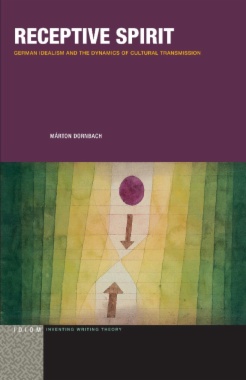Premised on the assumption that the mind is fundamentally active and self-determining, the German Idealist project gave rise to new ways of thinking about our dependence upon culturally transmitted models of thought, feeling, and creativity. Receptive Spirit elucidates the ways in which Kant, Fichte, Schlegel, and Hegel envisioned and enacted the conjunction of receptivity and spontaneous activity in the transmission of human-made models of mindedness. Their innovations have defined the very terms in which we think about the historical character of aesthetic experience, the development of philosophical thinking, the dynamics of textual communication, and the task of literary criticism.
Combining a reconstructive approach to this key juncture of modern thought with close attention paid to subsequent developments, Marton Dornbach argues that we must continue to think within the framework established by the Idealists if we are to keep our bearings in the contemporary intellectual landscape.
- Cover
- Contents
- Introduction: Idealism and Finitude
- Catching Then Becomes a Power
- The Kantian Premises
- Hegel’s Critique of Kant
- Gadamer’s Reversal of Hegel
- 1 Kant on the Formation of Taste
- The Quarrel Continued
- Most in Need of Examples
- The Ideal of Beauty
- Exemplary Objects and the Artificiality of Taste
- The Centrality of Art
- Succession and Practical Criticism
- 2 Kantian Revisionism and Revisionist Kantianism
- Kant on Better Understanding
- Fichte as Explicator of Kant
- Originality Disowned
- 3 Esoteric Enlightenment in Fichte
- Choosing to Be Free
- The Fichtean Experiment
- Transcendental Pedagogy
- 4 Friedrich Schlegel on Textual Communication
- Schlegel on the Spirit of Fichte’s Philosophy
- Constructed Readers
- Confused Authors
- Characterization
- Between Inspired and Methodical Reading
- 5 Exoteric Enlightenment in Hegel
- Dialogue and Dialectics
- Language as Universal Infection
- The Voices of the Phenomenology
- Conclusion: The Afterlife of a Distinction
- A Glance Back and a Question
- McDowell On Second Nature
- The Last Distinction
- The Unavailability of Reconciliation
- Acknowledgments
- Notes
- Bibliography
- Index
- A
- B
- C
- D
- E
- F
- G
- H
- I
- J
- K
- L
- M
- N
- O
- P
- Q
- R
- S
- T
- U
- V
- W
- Y
- Z

